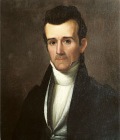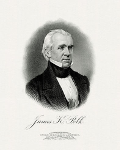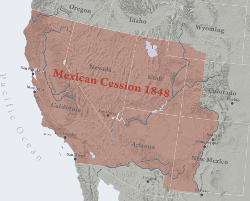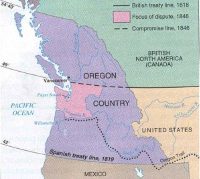President James K. Polk
James K. Polk was the 11th President of the United States. A champion of Manifest Destiny, he presided over the American victory in a war with Mexico and, on his watch, the United States greatly expanded its boundaries. Polk was born on Nov. 2, 1795, on his family's form in Mecklenburg County, North Carolina. He suffered poor health as a child and endured a particularly painful surgery. He attended school at home and at two schools in middle Tennessee, where his family moved when he was 10. He graduated from the University of North Carolina, with top honors in the classics and mathematics, in 1818 and returned home to study law. He expanded his knowledge of the law under Felix Grundy, a well-known Nashville trial attorney, and also served as a clerk of the Tennessee Senate. It wasn't long before Polk had his own law practice, in Columbia, Tenn. 
Polk found that he had a penchant for politics and ran for a seat in the Tennessee Legislature. He won, defeating the incumbent. Two years later, in 1984, he ran for a seat in the U.S. House of Representatives. He won and would go on to serve seven terms in the House. Polk, a member of the newly formed Democratic Party, was a close ally of Andrew Jackson, who was elected President in 1828. Jackson was re-elected in 1832 and named Polk Speaker of the House in 1835. Polk held the post for four years. Jackson's nickname was "Old Hickory"; Polk became so closely associated with Jackson that Polk gained the nickname "Young Hickory." Polk had had enough of Congress in 1838 and returned home, to run for governor of Tennessee. He won election. Two years later (the governor served two-year terms), Polk ran for re-election. He did not win, for a variety of reasons, including the fact that the country was in the midst of a depression. Polk made another attempt at the governor's mansion in 1843 and was defeated again. He returned his focus fully to the family plantation. Just a year later, Knox re-emerged on the national scene. Martin van Buren had won the presidency in 1836 but, tarred with the same bad economy that doomed his fellow Democrats like Polk, had lost the Election of 1840. The delegates at the 1844 Democratic national convention could not agree on a presidential candidate to put forward and finally followed a recommendation by Jackson to nominate Polk. Polk was known in some parts of the country but certainly not in others. He set about announcing expansive plans for what he would do if he were elected to the White House. One of those plans was for the assumption of sole ownership of the Oregon Territory, which the U.S. and Great Britain had shared for many years. The Oregon Territory had as its largest latitude 54°40´, and Polk embraced the slogan "Fifty-four Forty or Fight." 
The Election of 1844 featured a fierce fight between Polk and the Whig Party candidate Henry Clay. Polk's support for both taking over Oregon and for adding Texas as a state gained him many votes. The incumbent President, John Tyler, had had little support and, after a brief third-party run, had left his race and urged his supporters to vote for Polk. The election was very close, but Polk prevailed, in the process promising not to run for re-election. During his presidency, the U.S. acquired more than 800,000 square miles of territory and extended its boundary to the Pacific Ocean. Tyler, in his last days in office, had signed a bill providing for the annexation of Texas. Mexico, which technically still owned what the Texians now said was Texas Territory, cried foul. Polk sent a contingent of U.S. Army troops under Zachary Taylor to sort things out. Things turned violent, and Polk asked Congress to declare war on Mexico. The Mexican-American War had begun. 
The war featured fierce fighting and lasted 16 months, ending with an American victory after the capture of Mexico City. The Treaty of Guadalupe Hidalgo officially ended the war; under the terms of that treaty, the U.S. paid Mexico a large sum of money for what became the Mexican Cession. Slavery was still at the forefront of domestic issues. Before Congress was the Wilmot Proviso, a bill that would have banned slavery in all of the Mexican Cession. Polk, a slaveowner himself, opposed the bill. The House passed the bill multiple times, but the Senate never did. 
Polk's government had also in 1846 finalized the Oregon Treaty, establishing the northern border of that territory at the 49th parallel. Polk was also the President who, in 1848, confirmed that gold had been discovered in California, spurring the California Gold Rush. Polk kept his promise not to run for re-election. In the Election of 1848, Mexican-American War hero Zachary Taylor won the presidency. One of Polk's last acts as President was the signing of the bill that created the Department of Interior. Polk and his wife embarked on a tour of the South. Exhausted from his time in the White House, he again suffered from poor health and died at home in Nashville, in June 1849. He was 53. Among his estate requests was that his wife, Sarah, free their slaves when she died. The couple had no children. |
|
Social Studies for Kids
copyright 2002–2026
David White


